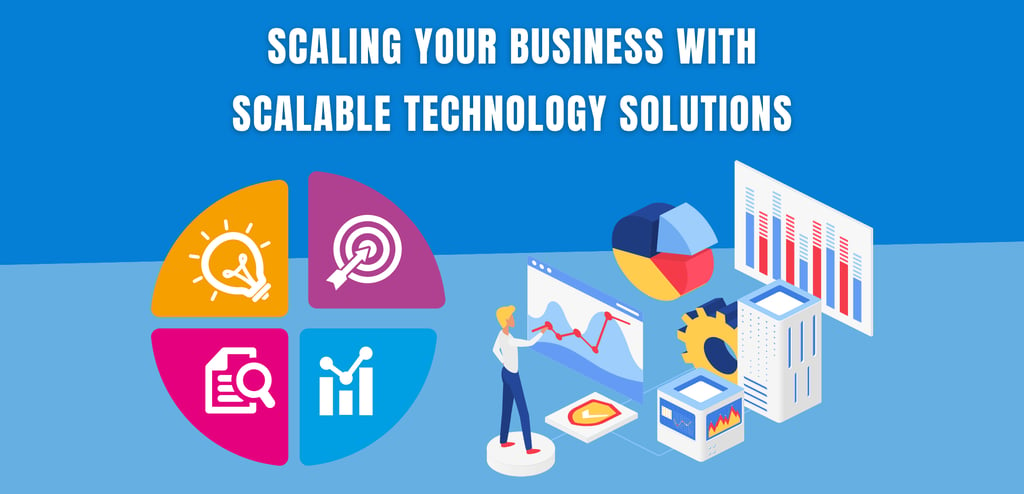
Scaling Your Business with Scalable Technology Solutions
By AZ Konnect Team
9/11/20244 min read


As your business grows, the need for scalable technology solutions becomes increasingly important. Scaling effectively ensures that your operations can handle increased demand, maintain efficiency, and continue to deliver value to your customers. Without the right technology in place, rapid growth can lead to operational bottlenecks, customer dissatisfaction, and missed opportunities. This blog post will explore the key aspects of scaling your business with scalable technology solutions.
1. Understanding Scalability in Business
Scalability refers to the ability of a business to grow and manage increased demand without compromising performance or losing efficiency. In the context of technology, scalability means that your IT infrastructure, software, and processes can expand to accommodate business growth, whether that’s an increase in customers, transactions, or data.
A scalable solution should be flexible, allowing you to add new features, users, or capabilities as needed, without requiring a complete overhaul of your existing systems. This flexibility is essential for supporting long-term growth and ensuring that your business remains competitive.
2. Key Areas for Implementing Scalable Technology Solutions
Cloud Computing: Cloud solutions are inherently scalable, allowing businesses to easily increase storage, computing power, and bandwidth as needed. With cloud computing, you can scale your IT resources up or down based on demand, which is especially beneficial for businesses with fluctuating workloads.
Software as a Service (SaaS): SaaS applications are designed to be scalable, offering businesses the ability to add new users or features without requiring significant investments in infrastructure. These solutions are often subscription-based, making it easy to scale costs in line with your business growth.
Customer Relationship Management (CRM) Systems: A scalable CRM system is critical for managing customer data, sales processes, and marketing efforts as your customer base grows. Look for CRM solutions that can handle large volumes of data, integrate with other business tools, and provide analytics to support decision-making.
Enterprise Resource Planning (ERP) Systems: ERP systems help businesses manage and integrate key operations, such as finance, supply chain, and human resources. A scalable ERP system ensures that your operations can grow with your business, providing real-time insights and streamlining processes across the organization.
Data Analytics Tools: As your business scales, the amount of data you generate will increase. Scalable data analytics tools enable you to process and analyze large datasets, providing valuable insights that can inform strategic decisions. These tools should be able to handle growing data volumes and provide advanced analytics capabilities to support your business objectives.
E-Commerce Platforms: For businesses in the retail space, a scalable e-commerce platform is essential for managing increased traffic, transactions, and product listings. Look for platforms that offer features like automated inventory management, seamless payment processing, and robust security measures to support your growth.
3. Benefits of Scalable Technology Solutions
Cost Efficiency: Scalable solutions allow you to pay only for the resources you need, helping to control costs as your business grows. Cloud services, for example, offer a pay-as-you-go model, which can be more cost-effective than investing in on-premises infrastructure.
Flexibility: Scalable technology provides the flexibility to adapt to changing business needs. Whether you’re launching a new product, entering a new market, or experiencing seasonal spikes in demand, scalable solutions can accommodate these changes without disrupting your operations.
Improved Performance: As your business grows, maintaining performance is critical. Scalable technology solutions ensure that your systems can handle increased loads, preventing downtime and ensuring a smooth user experience for customers and employees alike.
Enhanced Security: Growth often brings new security challenges, particularly as the volume of data and number of users increase. Scalable technology solutions often come with advanced security features that can be expanded as needed, protecting your business from evolving threats.
Future-Proofing: Investing in scalable technology solutions today ensures that your business is prepared for future growth. By choosing solutions that can evolve with your needs, you can avoid the costly and time-consuming process of replacing outdated systems down the line.
4. Challenges in Implementing Scalable Technology Solutions
Integration: As you scale, integrating new technology with your existing systems can be challenging. Ensuring seamless integration between old and new systems is crucial for maintaining efficiency and avoiding disruptions.
Cost Management: While scalable solutions offer cost efficiency, managing costs during rapid growth can still be challenging. It’s important to monitor your usage and ensure that you’re not over-committing resources or paying for features you don’t need.
Change Management: Scaling technology often requires changes in processes and workflows, which can be met with resistance from employees. Effective change management strategies, including training and communication, are essential for ensuring a smooth transition.
Vendor Reliability: As you rely more on third-party technology providers, the reliability of your vendors becomes critical. Choosing reputable vendors with a track record of delivering reliable, scalable solutions is essential for minimizing risk.
5. Steps to Implement Scalable Technology Solutions
Assess Your Needs: Start by evaluating your current technology stack and identifying areas where scalability is needed. Consider your long-term business goals and ensure that the solutions you choose align with these objectives.
Choose the Right Partners: Select vendors and technology partners who understand your business needs and can provide scalable solutions that match your growth trajectory. Look for partners with a strong reputation and a commitment to ongoing support.
Plan for Integration: Consider how new scalable technology will integrate with your existing systems. Develop a plan for data migration, process changes, and employee training to ensure a smooth implementation.
Monitor and Optimize: Continuously monitor the performance of your scalable solutions and optimize as needed. Regularly review your technology stack to ensure that it continues to meet your business needs and supports your growth objectives.
Conclusion
Scaling your business with scalable technology solutions is essential for maintaining efficiency, meeting customer demands, and staying competitive in today’s fast-paced market. By investing in scalable cloud services, SaaS applications, CRM systems, and other technology solutions, you can ensure that your business is well-equipped to handle growth and achieve long-term success. Careful planning, choosing the right partners, and ongoing optimization are key to making scalability work for your business.
Subscribe To Our Newsletter


